Mineral Resources In Nigeria
Minerals are naturally occurring, usually solid substances which possess definite or well defined physical and chemical features, shape, structure and chemical composition. They are and will always be the source of wealth for any nation endowed with them. The prosperity of any nation is often directly related to the development and utilization of its resources. The minerals in Nigeria’s landscape are distributed in all the geopolitical zones of the country and are found to be associated with the major rock types that constitute its geology. The rock types have produced numerous mineral raw materials such as lead, gold, tantalite, zinc, bitumen, coal, limestone kaolin, etc.
The Nigeria mineral resources could be classified as into two broad categories namely: Solid and Non Solid minerals.
A mineral resource is a concentration or occurrence of mineral materials of intrinsic economic interest in or on earth’s crust in such form and quantity that there are reasonable prospects for eventual economic extraction.
Below are some major mineral resources of Nigeria and their locations:
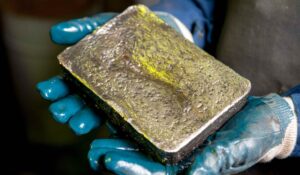
1. Gold
The gold is alluvial, that is found within the alluvial beds of rivers. The deposits around Ilesa are the most significant. Gold deposits are found also in Northern Nigeria, most prominently in Kwara State. It is not very dorminant in the Country. Gold production began in 1913 and peaked in the 1930s. During the Second World War, production declined. Mines were abandoned by colonial companies, and production never recovered. The Nigerian Mining Corporation (NMC) was formed in the early 1980s to explore for gold. In many other areas such as in Kebbi State illegal miners have virtually exhausted the deposits. Even in developed mines such as around Ilesa, illegal mining is a major problem. In conclusion the whole reserves are little.

2. Bitumen
Bitumen was first discovered in 1900, with focused exploration beginning in 1905. Bitumen deposits are found in Lagos State, Ogun State, Ondo State, and Edo State.
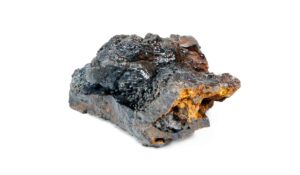
3. Iron Ore
Nigeria has several deposits of iron ore, but the purest deposits are in and around Itakpe Hill about 8 kilometres east-north-east of Okene and Lokoja in Kogi State, near the village of Nsude about 20 kilometres west of Enugu (Enugu State) and Muro Hills, north of Jos (Plateau State). The National Iron Ore Mining Company was founded in 1979 and given mission to explore, exploit, process, and supply iron ore concentrate to the Ajaokuta Steel Company (ASCL) in Ajaokuta and Delta Steel Company in Aladja. Generally, the Iron ore found is low medium quality. The Itakpe deposit which is near the Ajaokuta steel plant is the most developed.
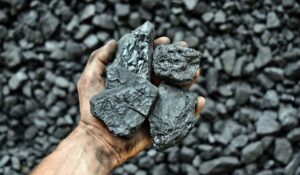
4. Coal
This mineral was first discovered in 1909 around Udi Hill in Enugu State and Okaba in present day Kogi State. The Nigerian Coal is the sub-bitumeous grade. At first, coal was mined through human labour performing the bulk of the work. However, today this has been replaced with mechanical contrivances which aided to increase its total productivity. The mining method is purely based on underground mining. This process involves a tunnel being built into the coal mainstream where explosives are used to dig out the coal. Later the light rail car hauls the coal from the tunnel to the surface from where they are either exported to other countries or consumed locally. Coal can be found in the central, middle-east and south east regions of the country (Anambra, Kogi, Benue and Enugu States). A reasonable estimate in these regions is put at a total of 396 million metric tonnes, while the unproven reserves are estimated to be in the region of 1,134 million tonnes.
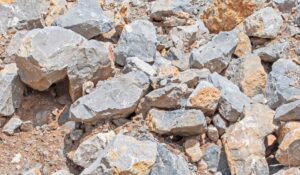
5. Limestone
This is a raw material majorly for the production of cement and its available in various parts of the country. The most significant locations are Ogun State, Edo State, near Sokoto (Sokoto State), Enugu State, near Calabar (Cross River) and near Yandev (Benue State).

6. Petroleum
It is a mineral, organic in origin and it occurs in the pores of the Sedimentary rocks (In between the spaces of the sedimentary rocks). It is derived from the decomposition of margin or vegetative matter besides it’s liquid form, Oil may be extracted in its gaseous state or natural gas.
There are two major broad types. These are the oil sources and natural gas. The main oil-based ones: gasoline (petrol), diesel and kerosene. There are four refineries in the country producing these and other less significant products. Two of these are located in Port Harcourt while the others are in Warri and Kaduna.
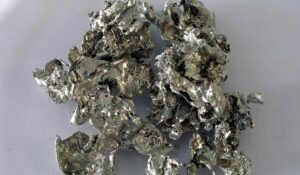
7. Tin And Columbite
These are found together in the Jos Plateau. Nigeria is a major producer of Columbite. At a time, it accounted for more than 90% of world production.
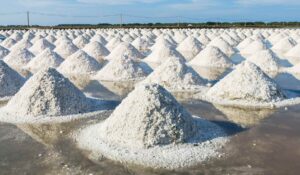
8. Salt
This is found at Awe and other locations in Benue valley and Abakiliki area of Ebonyi State. Illegal mining is a hindrance to their adequate functionality and growth.
The Importance Of Minerals
Mineral resources are of great importance to the nation.
1. It provides raw materials for some industries.
2. Minerals such as coal and gas are the main source of power and energy in the country.
3. Minerals contribute to the growth of towns, and cities, most especially on any country endowed with them.
4. The possession of minerals enriches foreign earning of Nigeria which enhances the standard of living of the people.
5. Mineral presence and their exploitation provide employment for many people and also lead to the acquisition of new skill. When the benefited individuals pay tax, government earning increases.
